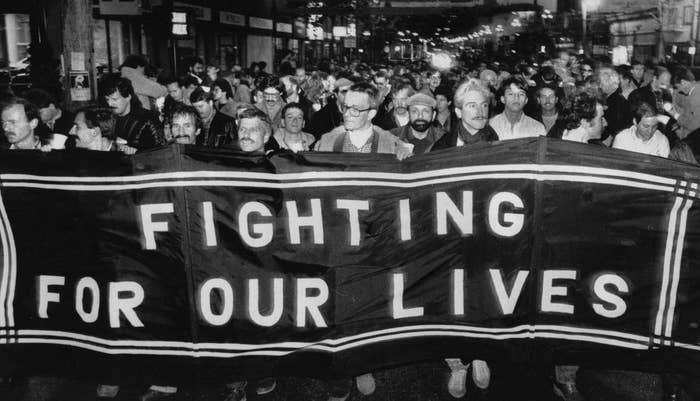
The first time I had sex with another man, I was 17 years old, and the year was 1987. HIV was killing gay men en masse — as well as trans women, cis Black women, people injecting drugs, and others — and there was no effective treatment, let alone a “warp speed” effort by the government to fight the spread of the virus with a vaccine. It was a terrifying time to come of age as a gay man.
As we begin the year 2021 with a historic vaccination effort, I’m reflecting on that scary time more than 30 years ago. How deeply I wish we had had a similar commitment by our government and society to fight HIV in the early days, before so many people in my community died.
These COVID-19 vaccines were developed and approved in record time, truly a miracle of science. Given that we still don’t have a vaccine for HIV after over 40 years, we should recognize the COVID-19 vaccine for the gift that it is and the freedom it will bring us. I’d be lying if I said it wasn’t upsetting to me to learn that nearly 40% of Americans are hesitant about getting the COVID-19 vaccine. We need these vaccines.
When I think back to my 17-year-old self, I wonder how different my life as a young gay man could have been if not for HIV. I wonder how many mentors and friends I would still have in my life if we had not lost so many to the virus. I wonder how much less frightening and more joyful it would’ve been to become sexually active back in 1987. I wonder how many political leaders, artists, business leaders, musicians, authors, and activists could have changed the world had they survived.
I was one of the lucky ones, since I was able to remain HIV-negative long enough to benefit from powerful HIV preventive medications. So many others were not.
Obviously, HIV and SARS-CoV-2 are very different viruses, and the scientific study of infectious diseases has advanced considerably in the past decades. But we know from recent years that HIV can be effectively treated, to the point where HIV-positive people who take medication consistently are very healthy and cannot transmit the virus to others. We also know that HIV-negative people can take a once-daily pill that almost eliminates their risk of infection. I know this because I take that pill — called PrEP — every day.
These effective approaches to HIV now exist, but it’s hard to overstate what a horrific job this country and the entire world did in responding to the HIV pandemic in the early years of the crisis. It took five years to develop a reliable HIV antibody test — five damn years just to be able to figure out if someone without symptoms has the virus. It took 15 years to develop effective treatments. It took more than 20 years to develop effective treatments that avoid terrible side effects. And it took 30 years to develop that once-daily prevention pill. We still have no vaccine.
Our society’s experience with HIV shows us just how grateful we should be that we have COVID-19 vaccines and that we have them so quickly. And it shows how critical it is for everyone, barring a legitimate health reason, to get a COVID-19 vaccine the minute they’re eligible. We can’t afford hesitancy about these shots. People need to think about the big picture. As HIV has taught us, that big picture, without vaccine-created herd immunity, is bleak.
Because of malicious anti-vaccination “activists” — many of whom falsely claim that COVID-19 is like the flu and dispute the effectiveness of masks — far too many people have been influenced by misinformation and thus harbor vaccine-hesitance. While a small number of people have health conditions that present real barriers to safe vaccination, for the vast majority of people, those health concerns are not applicable. These unfounded concerns risk doing immense harm to public health and our economic recovery.
We must always remember that vaccines aren’t just about protecting ourselves. They’re also about protecting our family, our friends, our neighbors, and our coworkers — our entire community. It’s about protecting everyone in our lives. It’s about getting businesses reopened, getting people back to work, getting schools fully up and running, and getting back to normal life.
In honor of the massive number of lives we’ve lost — to HIV and to COVID-19 — let’s not take COVID-19 vaccines for granted. It’s a gift and a miracle that they were developed so quickly. Had society shown the same determination around HIV therapies, preventatives, and vaccines, we’d be living in a different and better world.
Scott Wiener is a gay man and a California state senator representing San Francisco and northern San Mateo County. He does significant policy and budget work to support people living with HIV and end the HIV pandemic.
